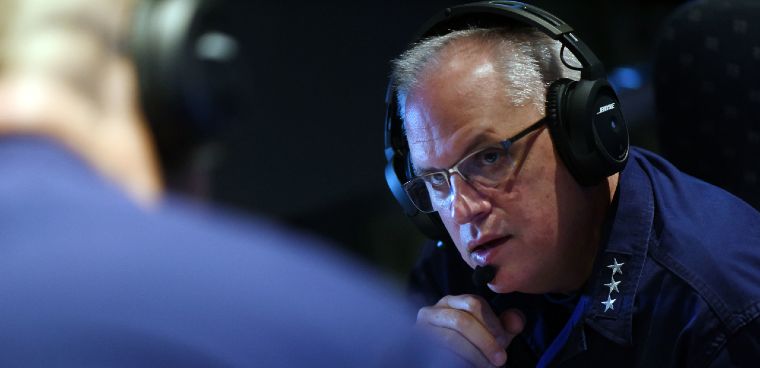Coast Guard looks to take law enforcement database mobile
The Coast Guard's deputy commander for operations said the maritime service wants to break down its Marine Information for Safety and Law Enforcement system into a series of mobile applications.

Vice Adm. Scott Buschman, then Coast Guard Atlantic Area Commander, reviews hurricane damage from a C-130 aircraft in Sept. 2018. (Photo credit: Petty Officer 2nd Class Adam Stanton)
The U.S. Coast Guard wants to convert its safety and law enforcement database to mobile applications.
Vice Adm. Scott Buschman, the Coast Guard's deputy commandant for operations, said modernizing the military service's 20-year old Marine Information for Safety and Law Enforcement system (MISLE) to be more mobile will help operators in the field be more efficient.
"We're looking at what the MISLE needs to be of the future," Buschman testified Oct. 20 during a House Committee on Transportation and Infrastructure Subcommittee on Coast Guard and Maritime Transportation hearing. "We're also looking at...taking pieces of MISLE and breaking it down in applications so they can use it in a mobile fashion."
MISLE, which includes some portions the public can access, houses data on marine accidents, search and rescue cases, law enforcement activities, vessel inspections and incidents involving pollution.
The Government Accountability Office found in a July 2020 report that the MISLE system suffered from data errors, inconsistent entries, and that the Coast guard needed to "identify and analyze alternatives to select solutions to meet mission needs."
Buschman said MISLE mobile apps mean operators, who are often boarding or on vessels, can enter data from the field instead of heading back to the office to do it on a computer.
"So the folks in the field that are out there boarding a vessel, maybe it's a commercial vessel, and right now, they have to drive back to their office and maybe several hours to enter data on a computer," Buschman said. "We're trying to give mobile apps to folks so they can be much, much more efficient."
Buschman noted that modernizing the system is important for readiness, but was deprioritized due to constrained budgets and sequestration.
"We weren't able to fund things. We had to scale back a little bit...whether it's maintenance, whether it's training shortfalls and those types of things," Buschman said. "[MISLE] is one of those things that really…falls in that category, to having the resources to be able to fund these really, really important things for us to do our jobs, as job enablers."
NEXT STORY: IGs look to expand investigative authority






